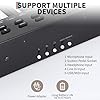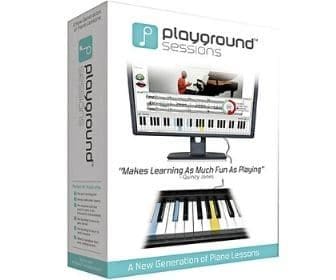Table of Contents
Mastering Piano Efficiently: Quick Learning Strategies
Learning to play the piano can be a rewarding yet daunting task for many. However, with the right approach and some clever practice hacks, the journey to becoming proficient can be significantly accelerated. This introduction explores effective techniques and strategies designed to enhance your learning efficiency, enabling you to master the piano more quickly than traditional methods. Emphasizing the importance of consistency, smart practice, and the use of modern tools, this guide aims to transform beginners into skilled pianists in a remarkably short period.
Maximizing Practice Time with Focused Sessions
To efficiently learn the piano, optimizing practice time is crucial. Here are ways to make each session focused and effective:
Donner Digital Piano Keyboard Velocity-Sensitive 88 Keys with Removable Piano Stand, Compact Beginner Home Electric Piano with Split Mode, LED Digital Tube for Display, and Triple Pedal DEP-08
15% OffYAMAHA P71 88-Key Weighted Action Digital Piano with Sustain Pedal and Power Supply (Amazon-Exclusive)
10% Off61-Key Portable Electronic Keyboard,Portable Keyboards with Headphone, Note Stickers, for Beginners,Full-Size Piano Keyboard for Practice, Travel & Home Use
$49.99 (as of January 24, 2026 19:12 GMT -08:00 - More infoProduct prices and availability are accurate as of the date/time indicated and are subject to change. Any price and availability information displayed on [relevant Amazon Site(s), as applicable] at the time of purchase will apply to the purchase of this product.)RockJam 61 Key Keyboard Piano Stand With Pitch Bend Kit, Piano Bench, Headphones, Simply Piano App & Keynote Stickers
$124.99 (as of January 24, 2026 19:06 GMT -08:00 - More infoProduct prices and availability are accurate as of the date/time indicated and are subject to change. Any price and availability information displayed on [relevant Amazon Site(s), as applicable] at the time of purchase will apply to the purchase of this product.)Using Short Practice Intervals for Fast Improvement
One of the most effective methods for learning piano quickly is to utilize short practice intervals, commonly known as the Pomodoro Technique. This approach breaks down practice sessions into manageable, focused periods of time followed by short breaks. Here’s how you can apply this technique to piano practice:
By incorporating these short, focused practice intervals into your daily routine, you can accelerate your piano learning process, making substantial improvements in a shorter time frame. Regular short sessions help maintain high levels of concentration and efficiency, leading to fast and durable learning outcomes.
The Role of Mental Practice in Learning Piano
Mental practice, or visualization, is an often overlooked yet powerful tool in learning piano. By mentally rehearsing playing the piano, students can enhance their memory, improve motor skills, and strengthen their overall performance without even touching the instrument. This method employs cognitive simulation to prepare the mind and body for actual play.
Visualization Techniques: Visualization in piano playing involves imagining yourself playing the piano, including seeing the keys, feeling the movements, and hearing the music. By vividly creating these sensory experiences in your mind, it is possible to engage the brain in a way that mirrors actual playing. Research shows that this form of mental exercise activates the same neural pathways as physical practice.
How to Play Keyboard in 14 Days: Daily Keyboard Lessons for Beginners (Play Music in 14 Days)
$12.99 (as of January 24, 2026 23:12 GMT -08:00 - More infoProduct prices and availability are accurate as of the date/time indicated and are subject to change. Any price and availability information displayed on [relevant Amazon Site(s), as applicable] at the time of purchase will apply to the purchase of this product.)Beginner Piano Book for Kids | Piano Lessons | Learn to Play Your First Songs | Intro to Piano
$10.97 (as of January 24, 2026 23:12 GMT -08:00 - More infoProduct prices and availability are accurate as of the date/time indicated and are subject to change. Any price and availability information displayed on [relevant Amazon Site(s), as applicable] at the time of purchase will apply to the purchase of this product.)Piano and Keyboard for Beginners: Comprehensive Guide for Absolute Beginners on How to Play Popular Piano Songs, Read Music and Master the Techniques ... Piano in 14 Days. (Learn to Play Instruments)
$13.85 (as of January 24, 2026 23:12 GMT -08:00 - More infoProduct prices and availability are accurate as of the date/time indicated and are subject to change. Any price and availability information displayed on [relevant Amazon Site(s), as applicable] at the time of purchase will apply to the purchase of this product.)Piano: Learn The Piano in 5 Easy Steps: A Self-Guided Piano Course for Beginners (with Online Video Instruction - Piano Learning Books for Beginning Piano Players)
17% OffImproving Memory Recall: Integrating mental practice in your learning routine can greatly enhance your ability to recall music. By closing your eyes and mentally walking through a piece, you train your brain to remember the sequence of notes and the associated finger placements without physical cues. This not only strengthens memory but also builds confidence.
Enhancing Concentration and Reducing Anxiety: Mental rehearsal also helps in focusing the mind and easing performance anxiety. Regular mental practice allows you to prepare for performances by visualizing a successful performance, which can help in managing stage fright and boosting self-assurance.
Neuromuscular Training: Even though no physical movement occurs during mental practice, imagining playing the piano helps condition the neuromuscular system, which is essential for fine motor skills required in piano playing. This type of practice aids in improving the efficiency and accuracy of movements, nearly as effectively as physical practice.
Routine Integration: To effectively utilize mental practice, integrate it into your regular practice sessions. Begin or end physical practice with a session of mental rehearsal, or use it as a tool when a piano is not accessible. This versatility greatly contributes to the continuous progress in learning piano.
Hacks for Memorizing Piano Pieces Quickly
Chunking Technique: This involves breaking down a piece into smaller, manageable sections or “chunks”. Instead of trying to absorb the whole piece at once, focus on mastering one small section at a time. Practice each chunk repeatedly until you can play it fluently. Then gradually combine the chunks, adding more as you gain confidence. This helps to reinforce memory through repetition and isolation of difficulties.
Use of Mental Play: Try to visualize playing the piano piece in your mind without actually touching the keys. This method, also known as mental practice or audiation, involves imagining yourself playing the piece, hearing the notes in your head, and visualizing the finger movements. Mental play can significantly enhance your memory and understanding of the piece, as it forces you to process the music deeply. Practice this away from the piano.
Hands Separately: Start by learning each hand’s part independently. This allows you to focus on the technical and musical challenges of each hand without being overwhelmed. Once you feel comfortable with both hands separately, slowly begin to integrate them together. This process can make the memorization process less daunting and more structured.
Use of Annotations: Writing down annotations on your score can be tremendously helpful. Mark fingerings, dynamics, or any unusual patterns in the music. These annotations act as mental cues, reinforcing your memory every time you play through the piece. The physical act of writing also helps in retaining information.
Repetition with Variation: Repetition is key to memorizing, but adding variation keeps the process engaging. Alter the dynamics, tempo, or rhythm slightly as you repeat sections. This not only prevents boredom but also deepens your understanding of the piece’s structure and expression, making memorization more robust.
Sleep on it: Your brain consolidates memory during sleep. Practice right before going to sleep to help strengthen musical memories. This doesn’t mean practicing till the point of exhaustion but rather a focused session before you start your bedtime routine.
Recital Practice: Regularly test your memory by performing the piece as you would in a recital. This includes setting up a performance environment, whether it’s playing for a friend, recording yourself, or setting up a mini-concert at your home. Performing under a bit of pressure can greatly enhance memorization and highlight parts of the piece that need more attention.
Streamlining Your Learning Process with Effective Techniques
Mastering the piano involves strategy as much as it does practice. Here are some effective techniques tailored to streamline your process and enhance your proficiency in playing the piano quickly.
Set Clear, Achievable Goals
Goal setting is crucial in organizing your learning path and keeping you motivated. Break down your piano learning journey into smaller, manageable goals. For example, aim to master a specific scale or a piece within a week before moving to more challenging compositions.
Optimize Your Practice Sessions
Effective practice is not about lengthy sessions but rather the quality and focus of the practice. Dedicate spaced repetition, a technique where practice is broken down into short, intense periods interspersed with breaks. This technique helps in better retention and skill consolidation.
Focus on Difficult Areas
Instead of running through entire pieces repetitively, identify and focus on passages that are challenging. This method, often called deliberate practice, ensures that you spend time improving your weaknesses, leading to faster overall progress.
Incorporate Technology
Utilize learning aids such as apps and online tutorials that offer interactive learning experiences. Tools such as metronomes and digital pianos can provide valuable feedback and facilitate self-learning. Digital platforms often include features for tracking progress, offering personalized insights.
Use Mental Play and Visualization
Mental practice, where you visualize playing the piano without actually touching the instrument, can significantly enhance motor memory and performance. This technique allows you to mentally rehearse movements and anticipate challenges, which can be beneficial before actual practice.
Seek Feedback Regularly
Regular feedback, either from a teacher or through self-assessment tools available in digital piano software, can help correct mistakes and refine technique. Don’t hesitate to record your sessions and critique them to understand your progress and flaws.
Keep It Fun and Varied
Maintaining enthusiasm and interest is key to sustained learning. Incorporate different music genres and experiment with various piano techniques. Playing along with recordings or other musicians can also greatly enhance your rhythical and auditory skills.
Conclusion
Efficiently learning the piano can be achieved through strategic practice rather than long, unfocused sessions. By incorporating practice hacks such as setting specific goals, leveraging technology like apps, breaking down pieces into manageable segments, and using mental play, the learning process becomes more engaging and effective. Incorporating regular feedback, either through a teacher or through self-assessment, ensures correct techniques and helps in overcoming challenges more swiftly. Following these methods, you can accelerate your learning curve and enjoy making music sooner.








































